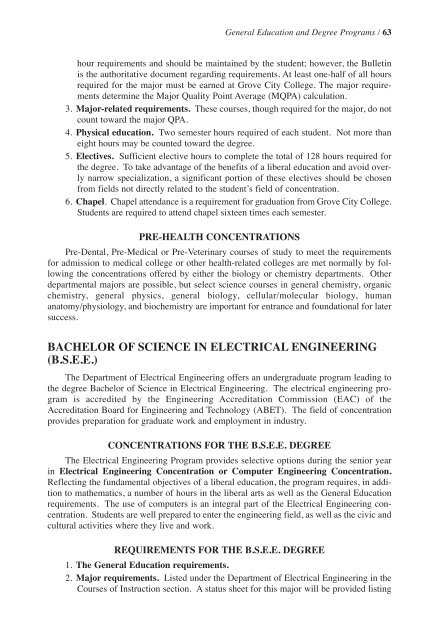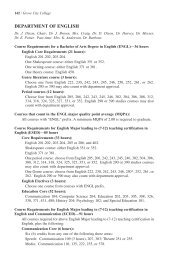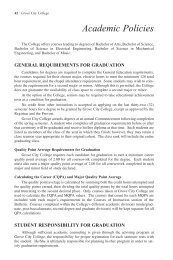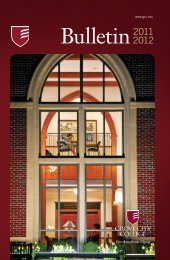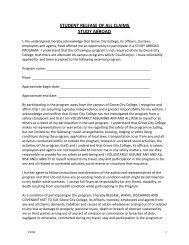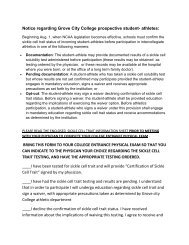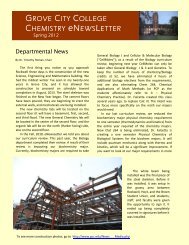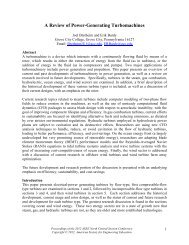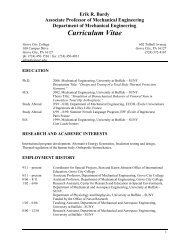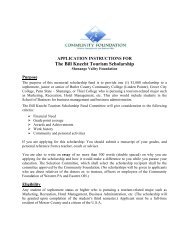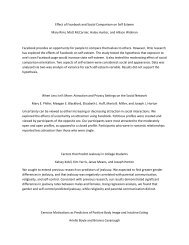2009–2010 - Grove City College
2009–2010 - Grove City College
2009–2010 - Grove City College
You also want an ePaper? Increase the reach of your titles
YUMPU automatically turns print PDFs into web optimized ePapers that Google loves.
General Education and Degree Programs / 63<br />
hour requirements and should be maintained by the student; however, the Bulletin<br />
is the authoritative document regarding requirements. At least one-half of all hours<br />
required for the major must be earned at <strong>Grove</strong> <strong>City</strong> <strong>College</strong>. The major requirements<br />
determine the Major Quality Point Average (MQPA) calculation.<br />
3. Major-related requirements. These courses, though required for the major, do not<br />
count toward the major QPA.<br />
4. Physical education. Two semester hours required of each student. Not more than<br />
eight hours may be counted toward the degree.<br />
5. Electives. Sufficient elective hours to complete the total of 128 hours required for<br />
the degree. To take advantage of the benefits of a liberal education and avoid overly<br />
narrow specialization, a significant portion of these electives should be chosen<br />
from fields not directly related to the student’s field of concentration.<br />
6. Chapel. Chapel attendance is a requirement for graduation from <strong>Grove</strong> <strong>City</strong> <strong>College</strong>.<br />
Students are required to attend chapel sixteen times each semester.<br />
PRE-HEALTH CONCENTRATIONS<br />
Pre-Dental, Pre-Medical or Pre-Veterinary courses of study to meet the requirements<br />
for admission to medical college or other health-related colleges are met normally by following<br />
the concentrations offered by either the biology or chemistry departments. Other<br />
departmental majors are possible, but select science courses in general chemistry, organic<br />
chemistry, general physics, general biology, cellular/molecular biology, human<br />
anatomy/physiology, and biochemistry are important for entrance and foundational for later<br />
success.<br />
BACHELOR OF SCIENCE IN ELECTRICAL ENGINEERING<br />
(B.S.E.E.)<br />
The Department of Electrical Engineering offers an undergraduate program leading to<br />
the degree Bachelor of Science in Electrical Engineering. The electrical engineering program<br />
is accredited by the Engineering Accreditation Commission (EAC) of the<br />
Accreditation Board for Engineering and Technology (ABET). The field of concentration<br />
provides preparation for graduate work and employment in industry.<br />
CONCENTRATIONS FOR THE B.S.E.E. DEGREE<br />
The Electrical Engineering Program provides selective options during the senior year<br />
in Electrical Engineering Concentration or Computer Engineering Concentration.<br />
Reflecting the fundamental objectives of a liberal education, the program requires, in addition<br />
to mathematics, a number of hours in the liberal arts as well as the General Education<br />
requirements. The use of computers is an integral part of the Electrical Engineering concentration.<br />
Students are well prepared to enter the engineering field, as well as the civic and<br />
cultural activities where they live and work.<br />
REQUIREMENTS FOR THE B.S.E.E. DEGREE<br />
1. The General Education requirements.<br />
2. Major requirements. Listed under the Department of Electrical Engineering in the<br />
Courses of Instruction section. A status sheet for this major will be provided listing


